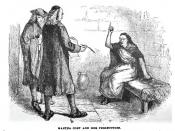"The Crucible" is a play written by the Pulitzer Prize winning writer, Arthur Miller. This 1953 play reflects Miller's concerns with McCarthyism, another instance in society when people were persecuted unjustly. An important theme in "The Crucible" is fear and suspicions are infectious and can produce a state of general hysteria that results in public order and irrationality.
Abigail Williams, a main character in the witchcraft accusations, is alone one of the main reasons why the hysteria strikes Salem. Abigail and several other girls are discovered chanting and dancing wildly by Reverend Paris. Immediately a suspicion arises because Puritan beliefs shun the girl's behavior. Reverend Parris sends an alert through the town the next morning after his daughter Betty Paris, acts in shock from her involvement in the actions. The girls are scornfully questioned about the supposed witchlike doings. The town girls follow after Abigail and are frightened by the harsh accusations.
To Abigail, accusing others of the same witchlike behavior seems to be her only way to rid her blame and guilt.
In the town of Salem, several innocent people including Elizabeth Procter, Rebecca Nurse, and Martha Corey are sentenced to trial for supposely following Satan. The townspeople are outraged knowing that the girls are wrongfully accusing innocent people. The husbands of two of the accused women, John Procter and Giles Corey, do all that they can to save their wives. John's previous association with the young Abigail Williams makes it hard for him to lead a guiltless path. John knows that to clear his wife's blame, he must confess to his adulturious actions, something that stands out to the judges because of his forgetfulness of that commandment earlier in the play. Ultimately the writer uses these two characters to show the struggle to regain rationality in...


